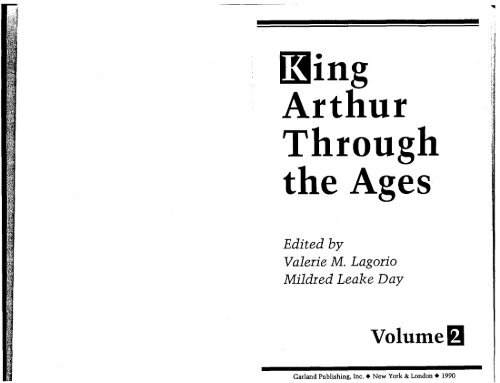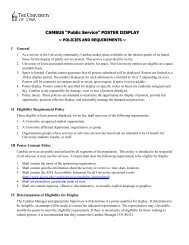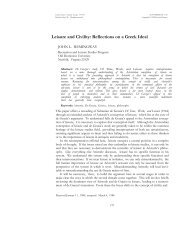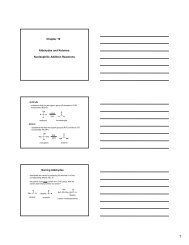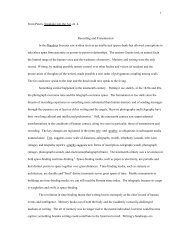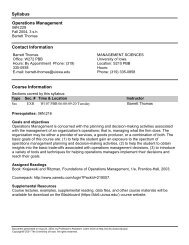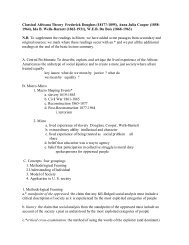King Arthur Through the Ages, ed. Valerie Lagorio - University of Iowa
King Arthur Through the Ages, ed. Valerie Lagorio - University of Iowa
King Arthur Through the Ages, ed. Valerie Lagorio - University of Iowa
You also want an ePaper? Increase the reach of your titles
YUMPU automatically turns print PDFs into web optimized ePapers that Google loves.
...<br />
[9ing<br />
<strong>Arthur</strong><br />
<strong>Through</strong><br />
<strong>the</strong> <strong>Ages</strong><br />
. 'i<br />
1<br />
Edit<strong>ed</strong> by<br />
<strong>Valerie</strong> M. <strong>Lagorio</strong><br />
Mildr<strong>ed</strong> Leake Day<br />
VolumeD<br />
Garland Publishing, Inc .• New York & London. 1990
82 Rebecca Cochran<br />
12Swinburne, "D<strong>ed</strong>icatory Epistle," in Swinbume Replies,<br />
99-100.<br />
13Swinburne, "D<strong>ed</strong>icatory Epistle," in Swinbume Replies, 105.<br />
!4Staines, "Swinburne's <strong>Arthur</strong>ian Poetry," 65-68.<br />
15Sce my article, "Swinburne's Concept <strong>of</strong> <strong>the</strong> Hero in The<br />
Tale <strong>of</strong> Balen," <strong>Arthur</strong>ian Interpretations 1 (1986), 48-53.<br />
Justice and Vindication in WiIIiam Morris's<br />
"The Defence <strong>of</strong> Guenevere"<br />
Florence Boos<br />
illiam Morris was <strong>the</strong> only major Victorian poet who chose<br />
Wm<strong>ed</strong>ieval settings for most <strong>of</strong> his poetry, a choice which <strong>of</strong>ten<br />
contribut<strong>ed</strong> to dismissals <strong>of</strong> his work as "escapist."1 Some critics<br />
grant<strong>ed</strong> partial dispensation from this epi<strong>the</strong>t to <strong>the</strong> dramatic monologues<br />
<strong>of</strong> The Defence <strong>of</strong> Guenevere (1858), but <strong>the</strong> conventional<br />
view <strong>of</strong> this work was reexpress<strong>ed</strong> as recently as 1981 by Margaret<br />
Lourie, in her introduction to <strong>the</strong> Garland scholarly <strong>ed</strong>ition <strong>of</strong> The<br />
Defence:<br />
[The) Guenevere poems refus<strong>ed</strong> to confront a single moral<br />
or intellectual question <strong>of</strong> <strong>the</strong>ir own age or any o<strong>the</strong>r. So<br />
far from displaying "<strong>the</strong> powerful application <strong>of</strong> ideas to<br />
life" later recommend<strong>ed</strong> by Arnold, <strong>the</strong>y display<strong>ed</strong> no<br />
ideas at all?<br />
Her subsequent oblique "praise" <strong>of</strong> Morris follows similar lines:<br />
"Like Yeats, Morris refus<strong>ed</strong> to compose <strong>the</strong> Victorian poetry <strong>of</strong><br />
social responsibility.,,3<br />
Such "modern(ist)" judgments <strong>of</strong> Morris seem to accept uncritically,<br />
ra<strong>the</strong>r than repudiate, <strong>the</strong> "moral" and "intellectual'''<br />
categories <strong>of</strong> his more censorious Victorian critics. A relat<strong>ed</strong> middle<br />
view grants Morris's stark m<strong>ed</strong>ieval projections a kind <strong>of</strong> alternate<br />
psychological realism, but waives fur<strong>the</strong>r inquiry into <strong>the</strong>ir<br />
intellectual and emotional coherence. I will argue that The Defence<br />
does not evade controversy on its own terms, and that its powerful<br />
evocations <strong>of</strong> stress, rupture, and violence reverberate in a world<br />
<strong>of</strong> stark ethical imperatives. Morris's contemporaries found <strong>the</strong>se<br />
imperatives appallingly bleak; most critics who interpret him as a<br />
precursor <strong>of</strong> <strong>the</strong> fill-de-sUcle simply ignore' <strong>the</strong>m.
84 Florence Boos<br />
Justice alld Vindication ill "The Defence <strong>of</strong> Guenevere " 85<br />
Similarly, I wiII suggest that <strong>the</strong> many narrative, chronological,<br />
and spatial dislocations <strong>of</strong> consciousness in The Defence <strong>of</strong> Guenevere<br />
are not signs <strong>of</strong> lapses in authorial control, but deliberate<br />
choices which witness <strong>the</strong> power <strong>of</strong> <strong>the</strong> principal characters' anxieties<br />
and <strong>the</strong> passions which overwhelm <strong>the</strong>ir lives. Many <strong>of</strong> <strong>the</strong>se<br />
characters suffer near-dislocation and abrogation <strong>of</strong> <strong>the</strong> usual<br />
structures and boundaries <strong>of</strong> identity, but no comforting censor<br />
orders or inhibits <strong>the</strong>ir direct responses to a world <strong>of</strong> mingl<strong>ed</strong><br />
desire and pain.<br />
On this account, <strong>the</strong>n, Morris's narrative disjunctions and<br />
symbolic juxtapositions anticipat<strong>ed</strong> techniques sometimes caIl<strong>ed</strong><br />
"modern" or "postmodern" in ambiances which remain recognizably<br />
Victorian. The world <strong>of</strong> <strong>the</strong> Defence poems is decaying and<br />
war-torn, and it is inhabit<strong>ed</strong> by lonely men and suffering women<br />
who <strong>of</strong>ten seek consolation in <strong>ed</strong>enic memories <strong>of</strong> childhood and<br />
fantasies <strong>of</strong> visionary reunion with nature in <strong>the</strong> moment <strong>of</strong> death.<br />
Amid <strong>the</strong>se lost struggles, <strong>the</strong> Defence poems enjoin <strong>the</strong>ir protag·<br />
onists to preserve a tenuous vision <strong>of</strong> beauty, at <strong>the</strong> risk <strong>of</strong> life, and<br />
<strong>of</strong>ten in defiance <strong>of</strong> certain failure and annihilation. The poems'<br />
testing <strong>of</strong> imagin<strong>ed</strong> identities against hostile forces reflects two<br />
tacit assumptions: that no honorable compromise with such "defences"<br />
<strong>of</strong> beauty is possible; and that it cannot take place in any<br />
shelter<strong>ed</strong> or even durable "palace <strong>of</strong> art." In Morris's work, no<br />
such shelter exists. He was anti-puritan, and he deeply dislik<strong>ed</strong><br />
conventional devices <strong>of</strong> didactic literature, so his presentations <strong>of</strong><br />
this rigoristic ethic is implicit, but his reluctance to preach <strong>the</strong><br />
obvious should not obscure his poetry's coherence, subtlety, and<br />
emotional force. Much <strong>of</strong> <strong>the</strong> density and subtlety <strong>of</strong> Morris's early<br />
work emerges in <strong>the</strong> passionate rhetorical indirection he us<strong>ed</strong> as a<br />
mode <strong>of</strong> expression for an unusual clarity <strong>of</strong> vision.<br />
Critical considerations <strong>of</strong> <strong>the</strong> title poem, "The Defence <strong>of</strong><br />
Guenevere," have respond<strong>ed</strong> to <strong>the</strong> principal question about it<br />
which I have rais<strong>ed</strong> above. Does <strong>the</strong> poem provide a coherent<br />
intellectual, moral, or artistic "defence" <strong>of</strong> Guenevere? Or is her<br />
monologue simply a painterly flourish <strong>of</strong> deviously emotional<br />
self·revelation? What interpretations can be found for <strong>the</strong> angelicaIly<br />
impos<strong>ed</strong> "choice <strong>of</strong> cloths"? Her refusal to account for <strong>the</strong><br />
blood-spatter<strong>ed</strong> b<strong>ed</strong>? Her aIlusion to her own weakness and<br />
beauty? Or her threat that Launcelot will save her once gain, in<br />
trial by combat?<br />
One view <strong>of</strong> <strong>the</strong> poem, that <strong>of</strong> Laurence Perrine, presents it as<br />
a rhetorical tour de force:<br />
... But Morris no more necessarily condones Guenevere's<br />
conduct than Milton does Satan's when he describes <strong>the</strong><br />
archfiend as a "great Commander" and as possessing<br />
"dauntless courage." Morris has merely taken one <strong>of</strong><br />
Malory's characters in a moment <strong>of</strong> stress and brought her<br />
intensely alive. His task has been not to excuse or blame,<br />
but to vivify.4<br />
Perrine bases his argument in part on a specious analogy with<br />
Browning: " .. . <strong>the</strong>re is no more reason for supposing that Morris<br />
is justifying [his] characters than <strong>the</strong>re is to believe that Browning<br />
is defending <strong>the</strong> Duke <strong>of</strong> Ferrara or <strong>the</strong> Bishop <strong>of</strong> SI. Prax<strong>ed</strong>'s.',s<br />
Perrine's point is undercut by <strong>the</strong> fact that <strong>the</strong> ironies <strong>of</strong><br />
Browning's early dramatic monologues usually underscore <strong>the</strong> sort<br />
<strong>of</strong> moral judgments which, according to Perrine, Morris suppos<strong>ed</strong>ly<br />
waives. We enjoy <strong>the</strong> process <strong>of</strong> uncovering <strong>the</strong>ir systematic<br />
deceptions because <strong>the</strong> Duke <strong>of</strong> Ferrara and Bishop <strong>of</strong> St. Prax<strong>ed</strong>'s<br />
are manifestly evil- arrogant, grasping, murderous hypocrites.<br />
Nor do <strong>the</strong>y draw our sympathy by tremulous courage in <strong>the</strong> face<br />
<strong>of</strong> public humiliation and a threaten<strong>ed</strong> execution at <strong>the</strong> stake.<br />
Morris's own 1856 review <strong>of</strong> Mell and Womell also makes clear<br />
that he preferr<strong>ed</strong> <strong>the</strong> poems <strong>of</strong> heroism and love ("Before,"<br />
"After," and "Childe Roland," for example), and he conspicuously<br />
fail<strong>ed</strong> to share Browning's fascination with devious hypocrisy: <strong>of</strong> .<br />
Bishop Bloughram, for example, he remarks bluntly that "for my<br />
part I dislike him thoroughly.,,6 In "The Statue and <strong>the</strong> Bust,"<br />
Browning had carefully left questions about <strong>the</strong> morality <strong>of</strong> adultery<br />
in suspension, but criticiz<strong>ed</strong> <strong>the</strong> cautious lovers as follows:
86<br />
Florence Boos<br />
Justice and Vindication in "The Defence <strong>of</strong> Guenevere" 87<br />
... <strong>the</strong> sin I impute to each frustrate ghost<br />
Is-<strong>the</strong> unlit lamp and ungirt loin ....<br />
In his review, Morris essentially agrees. He quickly passes over <strong>the</strong><br />
sin <strong>of</strong> adultery, but expresses strong moral contempt for <strong>the</strong><br />
hypocrisy <strong>of</strong> time-serving and "cowardly irresolution":<br />
Yet were <strong>the</strong> lovers none <strong>the</strong> less sinners, <strong>the</strong>refore, ra<strong>the</strong>r<br />
<strong>the</strong> more in that <strong>the</strong>y were cowards; for in thought <strong>the</strong>y<br />
indulg<strong>ed</strong> <strong>the</strong>ir love freely, and no fear <strong>of</strong> God, no hate <strong>of</strong><br />
wrong or love <strong>of</strong> right restrain<strong>ed</strong> <strong>the</strong>m, but only a certain<br />
cowardly irresolution.?<br />
Such remarks express an early form <strong>of</strong> his lifelong belief in <strong>the</strong><br />
moral value <strong>of</strong> "resolute" action and liberation <strong>of</strong> "frustrate<br />
ghost(s)," temper<strong>ed</strong> by a personal ideal <strong>of</strong> fidelity which he never<br />
abandon<strong>ed</strong>.<br />
A somewhat different view <strong>of</strong> Morris's Guenevere emerges in<br />
Carole Silver's "'The Defence <strong>of</strong> Guenevere': A Fur<strong>the</strong>r Interpretation."s<br />
Like Perrine, Silver assumes Guenevere's moral culpability,<br />
but she argues that<br />
Our sympathy remains with Guenevere and her great but<br />
guilty love. The passion in whose name she has transgress<strong>ed</strong><br />
remains more important than her transgression.<br />
Guenevere's testimony, look<strong>ed</strong> at in ful~ is to <strong>the</strong> awful<br />
power <strong>of</strong> a love that dissolves all-morality includ<strong>ed</strong> - in<br />
it. <strong>Through</strong> this testimony we can plainly see Morris's<br />
pr<strong>of</strong>ound grasp <strong>of</strong> illicit romantic passion?<br />
This interpretation is more faithful than Perrine's to <strong>the</strong> poem's<br />
rhetorical surge toward sympa<strong>the</strong>tic identification with<br />
Guenevere, who at great psychic cost has told <strong>the</strong> truth about her<br />
single-mind<strong>ed</strong> love for Launcelot. The "sympathy" Silver senses is<br />
clearly present in <strong>the</strong> poem's strong identification <strong>of</strong> Guenevere<br />
with <strong>the</strong> elements <strong>of</strong> a verdant and joyous nature, in turn<br />
associat<strong>ed</strong> with <strong>the</strong> inherent moral worth <strong>of</strong> spontaneous and infelt<br />
love. But Silver's rhetoric <strong>of</strong>fers only moderate hope that "<strong>the</strong><br />
awful power <strong>of</strong> a love that dissolves all-morality includ<strong>ed</strong>" - can<br />
suggest ano<strong>the</strong>r, more comprehensive morality-one, say, that may<br />
have guid<strong>ed</strong> Morris himself, when he saw himself, ironically, cast<br />
as <strong>Arthur</strong>. In her 1981 book,· The Romance <strong>of</strong> William Morris,<br />
Silver argues in more censorious fashion:<br />
[Guenevere] seeks to excuse her sin by suggesting its<br />
universality, and she blames it upon <strong>the</strong> moral confusion<br />
in <strong>the</strong> universe: things are not what <strong>the</strong>y seem. But she still<br />
must admit that, whatever <strong>the</strong> cause, she has done<br />
wrong. to<br />
[She] intends a speech <strong>of</strong> self-vindication, but her words<br />
and actions persuade <strong>the</strong> reader <strong>of</strong> her adultery .... She<br />
does not yet recognize in her cruelty to her opponents, her<br />
glee at <strong>the</strong> death <strong>of</strong> Meliagraunce, and her threats to<br />
destroy her enemies and <strong>the</strong> kingdom, <strong>the</strong> signs <strong>of</strong> her<br />
moral and emotional deterioration. 11<br />
O<strong>the</strong>r, less austere readings appear in several articles publish<strong>ed</strong><br />
in <strong>the</strong> 1970's. John Hollow's "William Morris and <strong>the</strong> Judgment<br />
<strong>of</strong> God, n12 for example, correctly observes that Morris <strong>of</strong>ten<br />
point<strong>ed</strong> a moral in his early work that "[men] who concern <strong>the</strong>mselves<br />
about God's judgments tend to take <strong>the</strong>ir own judgments for<br />
His .... For this reason, men should not conCern <strong>the</strong>mselves about<br />
God or his judgments .... ,,13 (a later, more secular variant occurs<br />
at <strong>the</strong> end <strong>of</strong> "The Hill <strong>of</strong> Venus," in <strong>the</strong> blossoming <strong>of</strong> <strong>the</strong> Pope's<br />
staff). Here, Hollow argues, "Morris's Guenevere does not deny<br />
adultery, she denies Gauwaine's claim to know God's judgment <strong>of</strong><br />
her.,,14<br />
A more "aes<strong>the</strong>tic" vindication appears in Patrick<br />
Brantlinger's 1973 article, "The Defence <strong>of</strong> Guenevere and O<strong>the</strong>r<br />
Poems,,,15 which suggests that Morris elevates Guenevere's sheer<br />
beauty to a moral force. Guenevere's defense, Brantlinger<br />
remarks, is par~ <strong>of</strong> a "dialectic between art and life" in which<br />
Guenevere expresses a higher morality bas<strong>ed</strong> largely on aes<strong>the</strong>tic
,<br />
88 Florence Boos<br />
i· response: "<strong>the</strong> substance <strong>of</strong> [Guenevere's] defense is largely that<br />
she is so beautiful and love is so beautiful that she ought to be<br />
forgiven."<br />
In "Guenevere's Critical Performance" (1979),16 Jonathan F.<br />
S. Post dismisses moral issues altoge<strong>the</strong>r, and construes<br />
Guenevere as a rhetorician who, "like all <strong>of</strong> us, constructs dramas<br />
and comes to accept <strong>the</strong>se imagin<strong>ed</strong> creations as perhaps <strong>the</strong> only<br />
form <strong>of</strong> truth we might ever know in this world.,,17 Perhaps-yet<br />
Browning's murderer Guido "constructs" as consummately as<br />
Guenevere. Even Post adopts a mildly normative tone in his conclusion<br />
that "Guenevere's defense seems also a young author's<br />
defense <strong>of</strong> poetry, while <strong>the</strong> most basic denial <strong>of</strong> Gauwaine and his<br />
accusations, whatever <strong>the</strong>y are, is <strong>the</strong> poet's refusal ever to let him<br />
speak.,,18<br />
A deeper point emerges in Dennis Balch's 1975 "Guenevere's<br />
Fidelity to <strong>Arthur</strong> in 'The Defence <strong>of</strong> Guenevere' and '<strong>King</strong><br />
<strong>Arthur</strong>'s Tomb,'" which attempts for <strong>the</strong> first time to read<br />
Guenevere's allegory <strong>of</strong> <strong>the</strong> blue and r<strong>ed</strong> cloths as a coherent<br />
representation <strong>of</strong> her situation. He too assumes her "guilt," but<br />
remarks perceptively that Morris<br />
[pJerhaps ... realiz<strong>ed</strong> that <strong>the</strong> <strong>Arthur</strong>ian legends embodi<strong>ed</strong><br />
a system <strong>of</strong> values contrary to <strong>the</strong> values he himself<br />
was developing which would depend on <strong>the</strong> central importance<br />
<strong>of</strong> <strong>the</strong> individual sensual experience ra<strong>the</strong>r than a<br />
denial <strong>of</strong> man's animal nature. 19<br />
Aspects <strong>of</strong> several <strong>of</strong> <strong>the</strong>se views seem to me right, but I would<br />
stress <strong>the</strong> extent to which Morris was no more willing than <strong>the</strong><br />
author <strong>of</strong> "The Palace <strong>of</strong> Art" to accept any casuistry that <strong>the</strong>re is<br />
an underlying antagonism between morality and beauty, life and<br />
art. Guenevere's beauty would be insufficient, were it not align<strong>ed</strong><br />
with a "truth" which it enhanc<strong>ed</strong> - a truth which Morris found<br />
largely in sympathy with her victimization. For Morris, such sympathies<br />
clearly overrode any questions about conventional transgression<br />
<strong>of</strong> arbitrary sexual codes and harmoniz<strong>ed</strong> with deeper<br />
Justice and Vindication in "The Defence <strong>of</strong> Guenevere" 89<br />
loyalties that guid<strong>ed</strong> his evolving sense <strong>of</strong> social and political<br />
morality.<br />
Morris and his friends were <strong>of</strong> course familiar with discussions<br />
<strong>of</strong> that great Victorian codification <strong>of</strong> <strong>the</strong> double standard, <strong>the</strong><br />
Divorce Law <strong>of</strong> 1857, which permitt<strong>ed</strong> men but not Women to sue<br />
for divorce on grounds <strong>of</strong> adultery. Morris compos<strong>ed</strong> most <strong>of</strong> The<br />
Defence poems in 1857, and he and his ra<strong>the</strong>r idealistic and iconoclastic<br />
friends wish<strong>ed</strong> to make clear <strong>the</strong>ir support for a single<br />
standard <strong>of</strong> romantic and marital obligation bas<strong>ed</strong> on affection,<br />
not legal compulsion. In keeping with this ethic, Guenevere eventually<br />
claims a right to tolerance and fre<strong>ed</strong>om from censorious<br />
male judgment, and she avers that she and Launcelot have both<br />
act<strong>ed</strong> rightly, even heroically, in a context which is both restrictive<br />
and oppressive.<br />
All <strong>the</strong> critics cit<strong>ed</strong> assume that Guenevere has in fact committ<strong>ed</strong><br />
adultery, but Morris's poem actually leaves <strong>the</strong> issue in<br />
suspension, which suggests that <strong>the</strong> question <strong>of</strong> technical innocence<br />
may have been a matter <strong>of</strong> relative indifference to him. As<br />
Angela Carson and o<strong>the</strong>rs have point<strong>ed</strong> out,20 Malory had present<strong>ed</strong><br />
two possibly conflicting accounts <strong>of</strong> <strong>the</strong> lovers' conduct.<br />
The incident which resembles Morris's poem more closely occurs<br />
in "The Knight <strong>of</strong> <strong>the</strong> Cart" (Book XIX <strong>of</strong> "The Book <strong>of</strong> Sir<br />
Launcelot and Queen Guinevere"); in it, Malory makes clear<br />
Guinevere's innocence <strong>of</strong> <strong>the</strong> ra<strong>the</strong>r ludicrous charge that she has<br />
slept with one <strong>of</strong> her wound<strong>ed</strong> knights, but describes with amusement<br />
<strong>the</strong> assignation between Launcelot and Guinevere which prec<strong>ed</strong>es<br />
Mellyagaunte's discovery <strong>of</strong> <strong>the</strong> blood-stain<strong>ed</strong> sheets.<br />
On <strong>the</strong> o<strong>the</strong>r hand, in Book XX, "The Most Piteous Tale <strong>of</strong><br />
<strong>the</strong> Morte <strong>Arthur</strong> Saunz Guerdon," Launcelot's assertion that she<br />
has been "trew unto my lorde <strong>Arthur</strong>,,21 is given what seems to be<br />
<strong>the</strong> author's endorsement. After <strong>the</strong> queen invites Launcelot to her<br />
b<strong>ed</strong>chamber (as she does in Morris's poem), Malory's narrator<br />
becomes studiously coy: "whe<strong>the</strong>r <strong>the</strong>y were ab<strong>ed</strong> o<strong>the</strong>r at o<strong>the</strong>r<br />
maner <strong>of</strong> disport is, me lyste oat <strong>the</strong>re<strong>of</strong> make no mencioD, for love<br />
that tyme was not as love ys nowadayes" (821). <strong>Through</strong>out Book
90 Florence Boos<br />
The apparent discrepancy between Books XVIII and XX remains<br />
unresolv<strong>ed</strong>, but some aspects <strong>of</strong> Morris's Guenevere may be<br />
consistent with <strong>the</strong> Guenevere <strong>of</strong> Malory's Book XX, Launcelot's<br />
faithful lover in spirit, who mayor may not have remain<strong>ed</strong> loyal to<br />
her husband.<br />
Malory's account <strong>of</strong> Arlhur's kingdom also includes an immense<br />
range <strong>of</strong> o<strong>the</strong>r material which Morris simply omits, whose<br />
cumulative effect is to make Launcelot and Guinevere's affair one<br />
node <strong>of</strong> an elaborate network <strong>of</strong> social and political loyalties,<br />
disloyalties, and intrigues. Malory's <strong>Arthur</strong> and Guinevere are on<br />
fairly good terms, and Gauwaine's anger is partially provok<strong>ed</strong> by<br />
Launcelot's killing <strong>of</strong> his two bro<strong>the</strong>rs Gareth and Gaheris- as in<br />
Icelandic sagas, deaths <strong>of</strong> Malorian kinspeople require reparation.<br />
Malory narrates a trag<strong>ed</strong>y <strong>of</strong> inevitable conflict between honorable<br />
persons, who love and respect one ano<strong>the</strong>r, and generally subordinate<br />
brief moments <strong>of</strong> sexual passion to more important considerations<br />
<strong>of</strong> friendship, political honor, or loyalty to kin.<br />
Morris's "Defence," by contrast, ignor<strong>ed</strong> <strong>the</strong> personal ties between<br />
Malory's <strong>Arthur</strong> and Launcelot, suppress<strong>ed</strong> <strong>Arthur</strong>'s good<br />
nature, and modifi<strong>ed</strong> Malory's account <strong>of</strong> a military caste's interlocking<br />
feuds and attachments, to recreate a tale <strong>of</strong> two lovers<br />
whose over arching attraction and pain<strong>ed</strong> loyalty overwhelm <strong>the</strong>ir<br />
lives. In Morris's poem, narrative intensity and analysis have<br />
migrat<strong>ed</strong> inward, to make Launcelot and Guenevere's love a conlustice<br />
and Vindication in "The Defence <strong>of</strong> Guenevere" 91<br />
XX Launcelot also defends <strong>the</strong> queen's "honor" with apparent<br />
sincerity:<br />
.. my lady, quene Guenyver, ys as trew a lady unto youre<br />
person as ys ony lady Iyvyng unto her lorde .... (837).<br />
and he explains his regrettable abduction as follows:<br />
"Sir, hit was never in my thought. .. to withholde <strong>the</strong><br />
quene frome my lorde <strong>Arthur</strong>, but ... mesem<strong>ed</strong> hit was<br />
my parte to save her Iyff and put her from that daunger tyll<br />
bettir recover myght corn" (842).<br />
sequence <strong>of</strong> alienation ra<strong>the</strong>r than courtly intrigue. Morris's anguish<strong>ed</strong><br />
heroine seems especially remote from Malory's politically<br />
shrewd, cheerfully energetic, and self-respecting queen: Malory's<br />
Guinevere is routinely self-protective and resilient under stress;<br />
Morris' Guenevere blurts out her defense in a rush <strong>of</strong> inspir<strong>ed</strong><br />
compulsion; Malory's queen is alo<strong>of</strong> and autocratic; Morris's intense<br />
and vulnerable. Confronting "such great lords," Malory's<br />
Guinevere might feel a prudent mixture <strong>of</strong> anger and apprehension;<br />
but never Guenevere's "awe and shame." Against <strong>the</strong> densely<br />
textual background <strong>of</strong> <strong>the</strong> poem's modifi<strong>ed</strong> loyalties and passions,<br />
Morris seems to have intend<strong>ed</strong> his silence to suggest that <strong>the</strong><br />
victim's technical "guilt" or "innocence" Was not a significant<br />
moral issue.<br />
Guenevere, in any case, is one <strong>of</strong> several Defence heroines<br />
characteriz<strong>ed</strong> by physical vulnerability, courage in defense <strong>of</strong> passionate<br />
emotions, and vicarious identification with de<strong>ed</strong>s <strong>of</strong><br />
prouesse perform<strong>ed</strong> by <strong>the</strong>ir male lovers, a recurring pattern<br />
throughout Morris' early and middle writings. Morris's early<br />
poetic world is especially stark in its polarization by genres: in<br />
"The Defence" and its companion poem "<strong>King</strong> <strong>Arthur</strong>'s Tomb," a<br />
stereotypicaBy manly life <strong>of</strong> action and military self-defense drives<br />
Launcelot forth into <strong>the</strong> world, while Guenevere waits, confin<strong>ed</strong> in<br />
castle and nunnery, for external forces to determine her fate. His<br />
is an oppression <strong>of</strong> sustain<strong>ed</strong> arduous effort and repeat<strong>ed</strong> risk <strong>of</strong><br />
life, hers <strong>of</strong> self-conscious constriction and inactivity.22 The<br />
queen's defense is a great but isolat<strong>ed</strong> act, wrung from her in a<br />
state <strong>of</strong> acute distress. Memories <strong>of</strong> her moments in <strong>the</strong> garden<br />
with Launcelot provide some release from her burden <strong>of</strong> anxiety,<br />
but she remains essentially alone throughout <strong>the</strong> poem. As in <strong>the</strong><br />
rest <strong>of</strong> Tile Defence, only <strong>the</strong> rarest and most exceptional moments<br />
<strong>of</strong> fre<strong>ed</strong>om from constraint bring happiness and love unmarr<strong>ed</strong> by<br />
fear.<br />
The extreme rigidity <strong>of</strong> <strong>the</strong> poem's sexual roles also explains<br />
why so much (-<strong>of</strong> Guenevere's "defense" must indict her own<br />
victimization. She vindicates her passion as <strong>the</strong> mature love <strong>of</strong> a<br />
I<br />
I<br />
,<br />
I , I<br />
! '<br />
: :<br />
:1<br />
ili<br />
I,,; 'I'<br />
I1<br />
,',I
92 Florence Boos<br />
Justice and Vindication in "The Defence <strong>of</strong> Guenevere" 93<br />
woman in special circumstances - marri<strong>ed</strong> at any early age, for<br />
reasons <strong>of</strong> state, to a distinguish<strong>ed</strong> but neglectful spouse, she has<br />
preserv<strong>ed</strong> for years a singlemind<strong>ed</strong>, faithful attachment to ano<strong>the</strong>r<br />
~ man whom she would have preferr<strong>ed</strong> to marry. A powerless<br />
woman falsely judg<strong>ed</strong> by powerful men, she demands that she be<br />
permitt<strong>ed</strong> to construe "duty" and "fidelity" in terms that are intel.<br />
ligible in <strong>the</strong> actual circumstances <strong>of</strong> her life.<br />
When she lifts her downcast gaze and begins to accuse her<br />
accusers, she also pleads her ne<strong>ed</strong> to escape a life <strong>of</strong> weakness and<br />
repression, and defends <strong>the</strong> transforming strength <strong>of</strong> her love for<br />
Launcelot, her only human contact in a world <strong>of</strong> arbitrary<br />
manipulation and intrigue. She avers that she has violat<strong>ed</strong> no<br />
genuinely moral ideals; her <strong>of</strong>fense is that her physical beauty and<br />
love <strong>of</strong> Launcelot embody natural and creative forces which shame<br />
<strong>the</strong> destructive malice <strong>of</strong> Gauwaine, Mellyagraunce, and, by implication,<br />
<strong>Arthur</strong> himself. Her love is both <strong>the</strong> flower and <strong>the</strong> green<br />
fuse through which it drives. Nor is she altoge<strong>the</strong>r specious, as<br />
several prior critics have assum<strong>ed</strong>, in her claim that her beauty and<br />
Launcelot's heroism attest <strong>the</strong> virtue <strong>of</strong> <strong>the</strong>ir cause. To defend<br />
herself before her accusers, she has had to conquer internal voices<br />
<strong>of</strong> uncertainty and shame, and give articulation to modes <strong>of</strong> selfrespect<br />
which are bas<strong>ed</strong> on belief in natural human love.<br />
Launcelot's final rescue only confirms <strong>the</strong> psychological fre<strong>ed</strong>om<br />
she has already won from within.<br />
•••••<br />
The opening passages <strong>of</strong> "The Defence" present Guenevere as<br />
a desperate human being, constrict<strong>ed</strong> by her clo<strong>the</strong>s, confin<strong>ed</strong>, and<br />
about to be bound to <strong>the</strong> stake. Her emotions are painfully imm<strong>ed</strong>iate;<br />
her forehead is clammy with sweat, and her face stings as<br />
though she had been hit. Every thought and gesture is chok<strong>ed</strong>,<br />
strain<strong>ed</strong>, and constrict<strong>ed</strong> ("She threw her wet hair backward from<br />
her browJ Her hand close to her mouth touching her cheek"), as<br />
"knowing now that <strong>the</strong>y would have her speak," she begins her<br />
defense with a rote gesture <strong>of</strong> rhetorical deference:<br />
"God wot I ought to say, I have done ill,<br />
And pray you all forgiveness heartily!<br />
Because you must be right, such great lords- still .... (11.<br />
13·15)<br />
She does not beg for forgiveness, however, and retains a measure<br />
<strong>of</strong> autonomy from <strong>the</strong> first. Speech steadies her, and soon prompts<br />
her to defend herself. Consider, she asks, how life would seem to<br />
you in my stead:<br />
"Listen, suppose your time were come to die,<br />
And you were quite alone and very weak;<br />
Yea, laid a dying ... (11. 16·18)<br />
Suppose a hush should come, <strong>the</strong>n some one speak:<br />
" 'One <strong>of</strong> <strong>the</strong>se cloths is heaven, and one is hell,<br />
Now choose one cloth for ever; which <strong>the</strong>y be,<br />
I will not tell you .... (11. 21-24)<br />
In her allegory, <strong>the</strong> commanding patriarchal presence <strong>of</strong> a "great<br />
God's angel" presents <strong>the</strong> cloths, and demands that a bizarrely<br />
fateful choice be made without preparation or foreknowl<strong>ed</strong>ge:<br />
"And one <strong>of</strong> <strong>the</strong>se strange choosing cloths was blue,<br />
Wavy and long, and one cut short and r<strong>ed</strong>;<br />
No man could tell <strong>the</strong> better <strong>of</strong> <strong>the</strong> two.<br />
After a shivering half-hour, suppose you said:<br />
'God help! heaven's colour, <strong>the</strong> blue,' and he said, 'hell.'<br />
(ll. 30·38)
94 Florence Boos<br />
Justice and Vindication in "The Defence <strong>of</strong> Guenevere" 95<br />
Some critics have argu<strong>ed</strong> that <strong>the</strong> blue cloth symbolizes her<br />
adultery with Launcelot, but I agree with Balch that it represents<br />
more plausibly her "choice" to marry <strong>Arthur</strong>, forc<strong>ed</strong> upon her by<br />
"great lords" for solemn reasons <strong>of</strong> duty and state ("heaven's<br />
color"). In retrospect, <strong>the</strong> vow <strong>of</strong> her arrang<strong>ed</strong> marriage has now<br />
become "a little word,! Scarce ever meant at all." When Launcelot<br />
arrives, he turns her inner world "white with flame," and prompts<br />
<strong>the</strong> agoniz<strong>ed</strong> recognition that things might have been different, a<br />
recognition that utterly transforms <strong>the</strong> premises <strong>of</strong> her emotional<br />
life.<br />
The perverse arbitrariness and opacity <strong>of</strong> Guenevere's<br />
"choice" makes clear that it was no choice (perhaps <strong>the</strong> response<br />
to "r<strong>ed</strong>" would also have been "hell?"); her real point is that<br />
human emotional life ought not to be subject- to arbitrary<br />
manipulation. The same outrag<strong>ed</strong> sense <strong>of</strong> good faith betray<strong>ed</strong> also<br />
underlies <strong>the</strong> sudden force <strong>of</strong> her thrice repeat<strong>ed</strong> defense:<br />
"Never<strong>the</strong>less you, 0 Sir Gauwaine, lie,<br />
Whatever may have happen<strong>ed</strong> through <strong>the</strong>se years,<br />
God knows I speak truth, saying that you lie." (11. 46-48)<br />
For a time, at least - inde<strong>ed</strong>, for most <strong>of</strong> her marriage, if not all <strong>of</strong><br />
it - she has dutifully follow<strong>ed</strong> <strong>the</strong> forms <strong>of</strong> fidelity to her husband<br />
(<strong>the</strong> "blue cloth") as propriety, religion, and <strong>the</strong> angel requir<strong>ed</strong><br />
her to do. The results have been devastating.<br />
As her defense ga<strong>the</strong>rs rhetorical force, so, suddenly does her<br />
physical presence:<br />
Though still she stood right up, and never shrunk,<br />
But spoke on bravely, glorious lady fair!<br />
Whatever tears her full lips may have drunk,<br />
She stood, and seem<strong>ed</strong> to think, and wrung her hair,<br />
Spoke out at last with nO more trace <strong>of</strong> shame,<br />
With passionate twisting <strong>of</strong> her body <strong>the</strong>re: ... (11. 55-60).<br />
The narrator's admiring tribute, "glorious lady fair!" is <strong>the</strong> poem~s<br />
most direct authorial judgment). As Guenevere makes her life's<br />
most public declaration, she has thus sh<strong>ed</strong> her earlier "shame" ,<br />
and speaks without self-consciousness, as much for her own<br />
satisfaction as to persuade her accusers. Later in <strong>the</strong> poem (11.<br />
223-238), Gueneyere almost comes to embody <strong>the</strong> beauty and<br />
energy <strong>of</strong> nature, a surge <strong>of</strong> elemental forces, winds, waters, and<br />
seasonal progressions:<br />
"Yea also at my full heart's strong command,<br />
See through my long throat how <strong>the</strong> words go up<br />
... yea now<br />
This little wind is rising, ... (11. 228-29, 232-33).<br />
In keeping with this near-apo<strong>the</strong>osis is an identification <strong>of</strong> her love<br />
with seasonal change: Launcelot has first appear<strong>ed</strong> to her at<br />
Christmas, and summer brings surges <strong>of</strong> emotion that are literally<br />
elemental:<br />
"And in <strong>the</strong> Summer I grew white with flame,<br />
And bow<strong>ed</strong> my head down - Autumn, and <strong>the</strong> sick<br />
Sure knowl<strong>ed</strong>ge things would never be <strong>the</strong> same,<br />
"However <strong>of</strong>ten Spring might be most thick<br />
Of blossoms and buds, smote on me, and I grew<br />
Careless <strong>of</strong> most things, let <strong>the</strong> clock tick, tick<br />
"To my unhappy pulse, that beat right through<br />
My eager body .... (11. 68-77)<br />
The climax <strong>of</strong> her longing comes when she again meets Launcelot,<br />
in an emblematically wall<strong>ed</strong> palace garden, whose immurement<br />
paradoxically heightens her sense <strong>of</strong> pleasurable longing:
96<br />
Florence Boos<br />
Justice and Vindication in "The Defence <strong>of</strong> Guenevere" 97<br />
I was half mad ...<br />
wall<strong>ed</strong> round every way;<br />
I was right joyful <strong>of</strong> that wall <strong>of</strong> stone,<br />
That shut <strong>the</strong> flowers and trees up with <strong>the</strong> sky,<br />
And trebl<strong>ed</strong> all <strong>the</strong> beauty: .... (11. 110-114)<br />
In <strong>the</strong> epiphanic vision which follows, a strange interfusion<br />
with nature almost impels her to <strong>the</strong> <strong>ed</strong>ge <strong>of</strong> rational control. Her<br />
"tenderly darken<strong>ed</strong> fingers" merge eerily into <strong>the</strong> light, and "join"<br />
<strong>the</strong> variegat<strong>ed</strong> "yellow-spott<strong>ed</strong> singers," which sing in <strong>the</strong> trees, all<br />
"drawn upward by <strong>the</strong> sun."<br />
"A little thing just <strong>the</strong>n had made me mad;<br />
I dar<strong>ed</strong> not think, as I was wont to do,<br />
Sometimes, upon my beauty; if I had<br />
"Held out my long hand up against <strong>the</strong> blue,<br />
And, looking on <strong>the</strong> tenderly darken'd fingers,<br />
Thought that by rights one ought to see quite through,<br />
"There, see you, where <strong>the</strong> s<strong>of</strong>t still light yet lingers,<br />
Round by <strong>the</strong> <strong>ed</strong>ges; what should I have done,<br />
If this had join<strong>ed</strong> with yellow spott<strong>ed</strong> singers,<br />
"And startling green drawn upward by <strong>the</strong> sun?<br />
But shouting, loos<strong>ed</strong> out, see now! all my hair,<br />
And tranc<strong>ed</strong>ly stood watching <strong>the</strong> west wind run<br />
. . . I lose my head e'en now in doing this .... (11. 118-130)<br />
In this alter<strong>ed</strong> state, Launcelot's oddly adventitious arrival<br />
("In that garden fair came Launcelot walking .... ") is quicklY<br />
subsum<strong>ed</strong> into her epiphany. She now rejects forever <strong>the</strong> lessersaul<strong>ed</strong><br />
<strong>Arthur</strong>, as a man <strong>of</strong> 44great name and little love."<br />
The lovers' dreamlike garden tryst is appropriately beatific,<br />
but also leaves a puzzling question: "After that day why is it<br />
Guenevere grieves?" (I. 13 ). One obvious answer- continu<strong>ed</strong><br />
longing-woUld account for <strong>the</strong> return <strong>of</strong> <strong>the</strong> lines which follow,<br />
her second indignant refrain <strong>of</strong> denial:<br />
"Never<strong>the</strong>less you, 0 Sir Gauwaine, lie,<br />
Whatever bappen<strong>ed</strong> on through all tbose years,<br />
God knows I speak truth, saying that you lie. (11. 142-44)<br />
Passages such as <strong>the</strong>se bear <strong>the</strong> interpretation that Guenevere and<br />
Launcelot, for <strong>the</strong> most part at least, have been "courtly" lovers,<br />
whose observance <strong>of</strong> <strong>the</strong> code's formal proprieties makes possible<br />
her repUdiation <strong>of</strong> Gauwaine's charge - "Being such a lady, could<br />
I weep <strong>the</strong>se tears/ If this were true?"<br />
In any case, she now shifts to attack. She reminds Gauwaine<br />
that his mo<strong>the</strong>r had been behead<strong>ed</strong> on a similar charge <strong>of</strong> adultery,<br />
and Warns him ra<strong>the</strong>r bizarrely that her slain spirit may return to<br />
haunt him, as a kind <strong>of</strong> malign variant <strong>of</strong> <strong>the</strong> speaker in "Ode to<br />
<strong>the</strong> West Wind":<br />
... let me not scream out<br />
For ever after, when <strong>the</strong> shrill winds blow<br />
"<strong>Through</strong> half your castle-locks let me now shout<br />
For eVer after in <strong>the</strong> winter night;<br />
When you ride out alone (11. 158-62)'<br />
The threat only underscores once again her actual helplessness,<br />
for <strong>of</strong> course it can only be realiz<strong>ed</strong> in ano<strong>the</strong>r world .<br />
In this one, more mundanely, she next reminds her accusers <strong>of</strong><br />
Launcelot's physical prouesse, which has already defend<strong>ed</strong> her<br />
against Mellyagraunce's invasion <strong>of</strong> her b<strong>ed</strong>chamber and observation<br />
<strong>of</strong> "blood upon my b<strong>ed</strong>."
98<br />
Florence Boos<br />
lustice and Vindication in "The Defence <strong>of</strong> Guenevere"<br />
99<br />
"<br />
(:<br />
Whose blood <strong>the</strong>n pray you? is <strong>the</strong>re any law<br />
"To make a queen say why some spots <strong>of</strong> r<strong>ed</strong><br />
Lie on her coverlet? (11. 174-76)<br />
Silver interprets <strong>the</strong> "spots <strong>of</strong> r<strong>ed</strong>" as evidence <strong>of</strong> a thwart<strong>ed</strong> rape<br />
attempt by Mellyeagrance,23 but Elaine and English Showalter<br />
have observ<strong>ed</strong> that <strong>the</strong> Victorians heavily censor<strong>ed</strong> any reference<br />
to menstruation, <strong>the</strong> most obvious alternate explanation <strong>of</strong> <strong>the</strong><br />
"spots.,,24 Morris's homely retention <strong>of</strong> this Malorian detail may<br />
have seem<strong>ed</strong> to contemporary readers more daring than ludicrous.<br />
In any case, Guenevere gleefully recalls Mellyagraunce's fate<br />
at <strong>the</strong> hands <strong>of</strong> her "half-arm<strong>ed</strong>" champion, and two brief passages<br />
<strong>the</strong>n prec<strong>ed</strong>e <strong>the</strong> poem's ecstatic conclusion. The first is a<br />
remarkable set-piece, a climactic final evocation <strong>of</strong> her epiphanic<br />
self-image as a powerful force <strong>of</strong> nature:<br />
... say no rash word<br />
Against me, being so beautiful; my eyes,<br />
Wept all away to grey, may bring some sword<br />
"To drown you in your blood; see my breast rise,<br />
Like waves <strong>of</strong> purple sea, as here I stand;<br />
And how my arms are mov<strong>ed</strong> in wonderful wise,<br />
"Yea also at my full heart's strong command,<br />
See through my long throat how <strong>the</strong> words go up<br />
In ripples to my mouth; how in my hand<br />
"The shadow ties like wine within a cup<br />
Of marvellously colour'd gold; yea now<br />
This little wind is rising, look you up,<br />
"And wonder how <strong>the</strong> light is falling so<br />
Within my moving tresses: will you dare,<br />
When you have look<strong>ed</strong> a little on my brow,<br />
"To say this thing is vile? or will you care<br />
For any plausible lies <strong>of</strong> cunning wo<strong>of</strong>,<br />
When you can see my face with no lie <strong>the</strong>re<br />
"For ever? am I not a gracious pro<strong>of</strong>- (11.223-41)<br />
Notice how remote are <strong>the</strong> elements <strong>of</strong> this self-portrait from<br />
conventional images <strong>of</strong> female sexual beauty. Even <strong>the</strong> more<br />
obviously erotic descriptions ("see my breast rise! Like waves <strong>of</strong><br />
purple sea") have an oddly impersonal intensity (not "see how I<br />
move my arms" or "how I speak," but "see how my arms are mov<strong>ed</strong><br />
in wonderful wise. . . how <strong>the</strong> words go up in ripples to my<br />
mouth"). Such language suggests that she represents a generaliz<strong>ed</strong><br />
force <strong>of</strong> natural goodness, an alignment <strong>of</strong> id and superego<br />
curiously without ego. Her "face wit\l no lie <strong>the</strong>re! For ever" also<br />
provides a "gracious pro<strong>of</strong>" that innocence <strong>of</strong> spirit can embody<br />
itself in an appropriate outer form. This near-Keatsian<br />
assimilation <strong>of</strong> beauty to truth is obviously circular in its<br />
celebration <strong>of</strong> "beauty" as some kind <strong>of</strong> heterosexuallifeforce, but<br />
it is at least intelligible in <strong>the</strong>se terms, and it also provides a kind<br />
<strong>of</strong> abstract formal design <strong>of</strong> human emotions under stress. After<br />
<strong>the</strong>se lines <strong>the</strong> epiphanic vision fades, but Guenevere remains a<br />
person who has become conscious <strong>of</strong> her own dignity for <strong>the</strong> first<br />
time in <strong>the</strong> face <strong>of</strong> acute pain and likely death.<br />
In <strong>the</strong> next passage, she recalls her last tryst with Launcelot,<br />
but refuses to repeat his parting words: "By God! I will not tell you<br />
more to-day,! Judge any way you will-what matters it?" (11. 277-<br />
78). Launcelot's last words, <strong>of</strong> course, may have includ<strong>ed</strong> a<br />
promise <strong>of</strong> <strong>the</strong> rescue which follows (as <strong>the</strong>y had in Malory), but<br />
her defiant reticence also expresses her claim to privacy and<br />
autonomy. She stands expos<strong>ed</strong> to derision and judgment, and will<br />
hold private her last conversation with her lover, if necessary to<br />
death. Accordingly, she will contribute no more to her own<br />
defense: she can remember
lOO<br />
Florence Boos<br />
Justice and Vindication in "The Defence <strong>of</strong> Guenevere" 101<br />
- all, all, verily,<br />
But just that which would save me; <strong>the</strong>se things flit (n. 281-82).<br />
Those who view Guenevere as deceptive presumably consider<br />
this ano<strong>the</strong>r evasion. I would ra<strong>the</strong>r believe that her "defence"<br />
leads naturally to this silence, a form <strong>of</strong> emancipation from her<br />
accusers; in <strong>the</strong> end <strong>the</strong>ir judgments do not matter to her, or to<br />
Morris, and she refuses to yield fur<strong>the</strong>r to <strong>the</strong>ir compulsion.<br />
After all this, <strong>the</strong>re is admitt<strong>ed</strong>ly something anticlimactic, if<br />
opportune, about Launcelot's subsequent arrival on a "roan<br />
charger," at "headlong spe<strong>ed</strong>," a kind <strong>of</strong> equus ex machina who<br />
quickly but abruptly concludes <strong>the</strong> physical action <strong>of</strong> <strong>the</strong> poem.<br />
Guenevere has already won her psychological independence, after<br />
which <strong>the</strong> narrative <strong>the</strong>n conveniently provides a form <strong>of</strong> external<br />
confirmation - <strong>the</strong> "judgment <strong>of</strong> God." Appropriately, too, for <strong>the</strong><br />
first time in <strong>the</strong> poem, Guenevere's physical movements now embody<br />
happiness in simple ways: "She lean'd eagerly,! And gave a<br />
slight spring sometimes." Such small, human motions are consistent<br />
with <strong>the</strong> earlier idealiz<strong>ed</strong> descriptions, quot<strong>ed</strong> above (" ... she<br />
stood right up, and never shrank! But spake on bravely ... "). But<br />
<strong>the</strong>y are also less emblematic and more natural than <strong>the</strong> earlier<br />
apo<strong>the</strong>osis <strong>of</strong> Guenevere as <strong>the</strong> "glorious lady fair."<br />
••• *.<br />
What, <strong>the</strong>n, are <strong>the</strong> grounds Morris assigns for Guenevere's<br />
"defence"? Earlier, I review<strong>ed</strong> several alternate interpretations <strong>of</strong><br />
its substance. Some would construe her argument as one <strong>of</strong> obliquity,<br />
cunning, and deceit, or hold that her defense, though sincere,<br />
is bas<strong>ed</strong> largely on grounds <strong>of</strong> grand but helpless passion,<br />
and shifts and turns which tellingly reflect her ne<strong>ed</strong> for evasion and<br />
lack <strong>of</strong> more "rational" justifications. O<strong>the</strong>rs have argu<strong>ed</strong> that <strong>the</strong><br />
poem's principal criteria for judgment are aes<strong>the</strong>tic or rhetorical<br />
ra<strong>the</strong>r than moral. All <strong>the</strong>se views seem to me inadequate or incomplete,<br />
for I believe Morris wish<strong>ed</strong> to make <strong>the</strong> stronger case<br />
that Guenevere is essentially guiltless - and that her claims are not<br />
only coherent but ultimately persuasive. Her defense's anacolutha<br />
follow a deeper logic <strong>of</strong> justice, reason and emotion, and eventually<br />
create a sense <strong>of</strong> personal and psychological liberation.<br />
On this interpretation, Morris comes out well in <strong>the</strong> spectrum<br />
<strong>of</strong> mid-Victorian debates on <strong>the</strong> nature and role <strong>of</strong> women.25 c:::<br />
Apart from <strong>the</strong> Brownings, no major poets <strong>of</strong> <strong>the</strong> 1850's permitt<strong>ed</strong><br />
<strong>the</strong>ir heroines to indict <strong>the</strong> straiten<strong>ed</strong> circumstances <strong>of</strong> <strong>the</strong>ir lives,<br />
much less align <strong>the</strong>mselves rhetorically with liberating forces <strong>of</strong><br />
nature.<br />
To women who were obviously deni<strong>ed</strong> <strong>the</strong> most rudimentary<br />
forms <strong>of</strong> personal autonomy in contemporary Victorian society, a<br />
heroine who tries, however spasmodically, to break free <strong>of</strong> such<br />
constraints may have been an attractive figure. Compar<strong>ed</strong> with<br />
o<strong>the</strong>r adulterous women in English Roetry <strong>of</strong> <strong>the</strong> 1850's - Bulwer<br />
Lytton's passionately lonely but cruel Clytemnestra (The Earl's<br />
Return and O<strong>the</strong>r Poems, 1855), or <strong>the</strong> abjectly "sinful" Guinevere<br />
<strong>of</strong> Tennyson's 1859 Idylls-Guenevere is also a virtual paragon <strong>of</strong><br />
beneficent self-determination.<br />
Clearly, though, some <strong>of</strong> <strong>the</strong> poem's tacit premises severely<br />
limit its value as an assertion <strong>of</strong> female autonomy. At her weakest,<br />
Guenevere is an idealiz<strong>ed</strong> male projection <strong>of</strong> single-mind<strong>ed</strong><br />
heterosexual passion, born, like Byron's "woman," "for love<br />
alone." In <strong>the</strong> entire poem she mentions no human ties but Launcelot,<br />
and apparently has no significant obligations besides fidelity<br />
to <strong>Arthur</strong>'g "little love." Guenevere's "defence'~ - that she has<br />
been forc<strong>ed</strong> into a loveless marriage for reasons <strong>of</strong> state - takes r<br />
her social and physical powerlessness for grant<strong>ed</strong>, and Morris<br />
clearly exaggerates her "feminine" helplessness to exacerbate <strong>the</strong><br />
stifling intensity <strong>of</strong> her repress<strong>ed</strong> emotions at <strong>the</strong> beginning <strong>of</strong> <strong>the</strong><br />
poem. The overarching assumption <strong>of</strong> physical helplessness which<br />
underlies <strong>the</strong> poem's chivalric ethic assigns vastly different levels<br />
<strong>of</strong> responsibility to women and men. To impose more responsibility<br />
on women in sexual matters is bigotry, <strong>of</strong> course; but <strong>the</strong> reverse
102 Florence Boos<br />
Justice and Vindication in "The Defence <strong>of</strong> Guenevere" 103<br />
mixes compassion and empathy with kindly condescension and<br />
noblesse oblige.<br />
So <strong>the</strong> evidence is sympa<strong>the</strong>tic but mix<strong>ed</strong>. Only in flashes at<br />
first does Guenevere speak with conviction, analytical power, or<br />
noticeable insight. But <strong>the</strong> insights do come, and at her bestduring<br />
her brief quasi-transfiguration as a benign force <strong>of</strong> nature<br />
- she becomes for Morris an archetypal voice <strong>of</strong> liberation<br />
from <strong>the</strong> crippling social and sexual constraints that clos<strong>ed</strong> in on<br />
Victorian women like a vise. It is no accident that twelve years<br />
later <strong>the</strong> creator <strong>of</strong> Guenevere quietly but steadfastly refus<strong>ed</strong> to<br />
abide by Victorian social codes which almost enjoin<strong>ed</strong> on him <strong>the</strong><br />
role <strong>of</strong> a Gauwaine or an <strong>Arthur</strong>.<br />
At any rate, "The Defence <strong>of</strong> Guenevere" seems to me a<br />
genuine vindication <strong>of</strong> a limit<strong>ed</strong> but admirable female psyche. Her<br />
"defence" is really tw<strong>of</strong>old: first, a weaker argument, that mercy is<br />
justice for those whose natural desires have been repress<strong>ed</strong>; and a<br />
second, stronger one, that those who seem to require "forgiveness"<br />
may represent forces more natural and vital than those who "forgive"<br />
<strong>the</strong>m. In poetry at least, <strong>the</strong> meek can inherit <strong>the</strong> earth.<br />
When Guenevereconsciously identifies her passionate energies<br />
with <strong>the</strong> elements <strong>of</strong> nature and an idealiz<strong>ed</strong> sanctity <strong>of</strong> natural<br />
emotion, her real self grows in dignity, self-respect, and strength.<br />
Thus it seems to me that Guenevere's evocations <strong>of</strong> her past,<br />
her strange allegory <strong>of</strong> <strong>the</strong> opaquely ominous "cloths," her flashes<br />
<strong>of</strong> insight into herself and her accusers, and her triumphant<br />
repudiation <strong>of</strong> <strong>the</strong> self-blame and constriction which oppress<strong>ed</strong><br />
her are coherent and persuasive. In <strong>the</strong> end, Morris's rare combination<br />
<strong>of</strong> anti-puritanism, contempt for hypocrisy, and<br />
temperamental identification with victims <strong>of</strong> oppression help<strong>ed</strong><br />
him create one <strong>of</strong> <strong>the</strong> century's better vindications <strong>of</strong> a heroine's<br />
right <strong>of</strong> self-determination.<br />
<strong>University</strong> <strong>of</strong><strong>Iowa</strong><br />
NOTES<br />
lA shift away from <strong>the</strong> "escapist" line in Morris criticism<br />
occurr<strong>ed</strong> with PatrickBrantlinger's "The Defence <strong>of</strong> Guenevere<br />
and O<strong>the</strong>r Poems," Victorian Newsletter 44 (Fall 1973), 18-24.<br />
2Margaret Lourie, <strong>ed</strong>., The Defence <strong>of</strong> Guenevere and O<strong>the</strong>r<br />
Poems (New York, 1981),22.<br />
3Lourie, 22.<br />
4Laurence Perrine, "William Morris' Guenevere: An<br />
Interpretation," Philological Quarterly 39 (1960), 241.<br />
5Perrine, 241.<br />
6The Collect<strong>ed</strong> Work!' <strong>of</strong> William Morris, <strong>ed</strong>. May Morris. 24<br />
vols. (London, 1910-15), 1:330.<br />
7 Collect<strong>ed</strong> WorT"" I: 344.<br />
SCarole Silver, " 'The Defence <strong>of</strong> Grenevere': A Fur<strong>the</strong>r<br />
Interpretation," Studies in English Literature 9 (1969), 695-702.<br />
9Silver, 702.<br />
10Silver, The Romance <strong>of</strong> William Mo"is, (A<strong>the</strong>ns, Ohio,<br />
1981), 21.<br />
llSilver,77.e Romance, 24.<br />
12John Hollow, "William Morris and <strong>the</strong> Judgment <strong>of</strong> God,"<br />
PMLA 86 (1971), 446-51.<br />
13Hollow, 450.<br />
14Hollow, 447.<br />
15Brantlinger, 20.<br />
16Jonathan F. S. Post, "Guenevere's Crticial Performance" ,<br />
Victorian Poetry 17 (1979), 317-27.<br />
17 Post, 319.<br />
18pos t , 327.<br />
,<br />
i
1<br />
I<br />
1<br />
I<br />
,<br />
[<br />
•<br />
i<br />
!<br />
104 Florence Boos<br />
190ennis Batch, "Gllenevere's Fidelity to <strong>Arthur</strong> in 'Defence<br />
<strong>of</strong> Guenevere' and '<strong>King</strong> <strong>Arthur</strong>'s Tomb· ... Victorian Poetry 13<br />
(1975},70.<br />
20 Angela Carson, Philological Quarterly 42 (1963), 113-34;<br />
Silver. " 'The Defence <strong>of</strong> Guenevere'," 695-96; David Staines,<br />
"WiIJiam Morris' Treatment <strong>of</strong> His M<strong>ed</strong>ieval Sources in The<br />
Defence <strong>of</strong> Guenevere." Studies in Philology 70 (1973), 439-64.<br />
21Eugene Vinaver, The Works <strong>of</strong> Sir Thomas Malory (London.<br />
1962). 848. Page numbers in text are from this <strong>ed</strong>ition.<br />
22Please see my "Sexual Polarization in The Defence <strong>of</strong><br />
Guenevere," in Browning Institute Studies, vol. 13 (1985), 181-200.<br />
23Silver.The Romance. 20.<br />
24"Victorian Women and Menstruation," in Martha Vicinus,<br />
<strong>ed</strong> .• SUffer and Be Still: Women in <strong>the</strong> Victorian Age (Bloomington.<br />
Indiana, 1972). 38-44.<br />
25post correctly observes that Guenevere's eristic fluency is<br />
unusual in itself: "Tennyson's submissive Guenevere [sic) or his<br />
repeat<strong>ed</strong>ly hush<strong>ed</strong> Enid are more faithful to <strong>the</strong> original conception<br />
<strong>of</strong> women in romance, if somewhat less interesting as characters,<br />
than Morris's Queen" (318).<br />
<strong>King</strong> Mark in Wagner's Tristan und [solde<br />
Henry Hall Peyton ID<br />
In 1854 Richard Wagner wrote to Franz Liszt about a new idea for<br />
a music-drama. an operatic version <strong>of</strong> <strong>the</strong> legend <strong>of</strong> Tristan and<br />
Isolde. It was to be "a simple work," but a "most full-blood<strong>ed</strong><br />
musical conception ... 1 Again. in an 1856 letter to Liszt. Wagner<br />
wrote <strong>of</strong> "a simple work such as Tristan,'·2 The complet<strong>ed</strong> work was<br />
to be on a moderate scale. which Wagner thought would make it<br />
easier to perform. 3 Thus, Wagner inform<strong>ed</strong> Liszt about <strong>the</strong> inception<br />
<strong>of</strong> <strong>the</strong> composition <strong>of</strong> a music-drama which has been call<strong>ed</strong><br />
"one <strong>of</strong> <strong>the</strong> supreme achievements <strong>of</strong> mankind.,,4 From Wagner's<br />
comments, particularly <strong>the</strong> repeat<strong>ed</strong> use <strong>of</strong> <strong>the</strong> word "simple." one<br />
would expect a work <strong>of</strong> modest proportions and meager significance.<br />
Yet, in his Norton Lectures at Harvard in 1972, Leonard<br />
Bernstein view<strong>ed</strong> Tristan as a highly sophisticat<strong>ed</strong> and complex<br />
musical composition, speaking <strong>of</strong> its ambiguity exploit<strong>ed</strong> "in all<br />
three <strong>of</strong> <strong>the</strong> linguistic modes .... ,'.5 In fact, Bernstein. who devot<strong>ed</strong><br />
much attention to an analysis <strong>of</strong> <strong>the</strong> Prelude, found it fascinating in<br />
development and intricate in composition to <strong>the</strong> degree that <strong>the</strong>re<br />
is question as to whe<strong>the</strong>r <strong>the</strong> beginning section is written in <strong>the</strong> key<br />
<strong>of</strong> A minor or in no key at all. Bernstein conclud<strong>ed</strong> that "Tristan is<br />
<strong>the</strong> crisis work <strong>of</strong> <strong>the</strong> nineteenth century ... 6<br />
Bernstein's analysis <strong>of</strong> <strong>the</strong> chromatic ambiguity <strong>of</strong> <strong>the</strong> music <strong>of</strong><br />
this "crisis work" emphatically denies <strong>the</strong> claim <strong>of</strong> <strong>the</strong> composer<br />
that he was writing a "simple" work. for <strong>the</strong> Prelude to Tristan<br />
introduces a concept <strong>of</strong> musical time different from that <strong>of</strong> any<br />
previous composition. As Bernstein puts it:<br />
And this is what gives Tristan its true semantic<br />
quality- quite apart from <strong>the</strong> obvious semantic facts <strong>of</strong><br />
<strong>the</strong> text. <strong>of</strong> Wagner's own poetry; <strong>of</strong> chivalry and magic<br />
potions and betrayal; and apart from leitmotivs signifying<br />
desire or death. I am speaking <strong>of</strong> musical semantics as we


